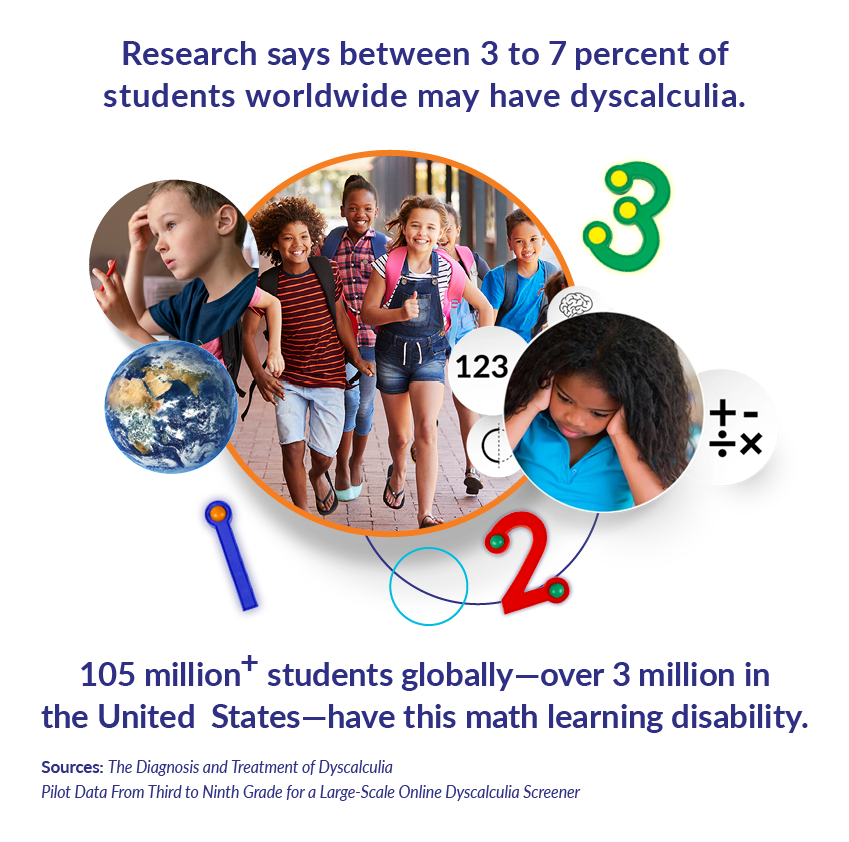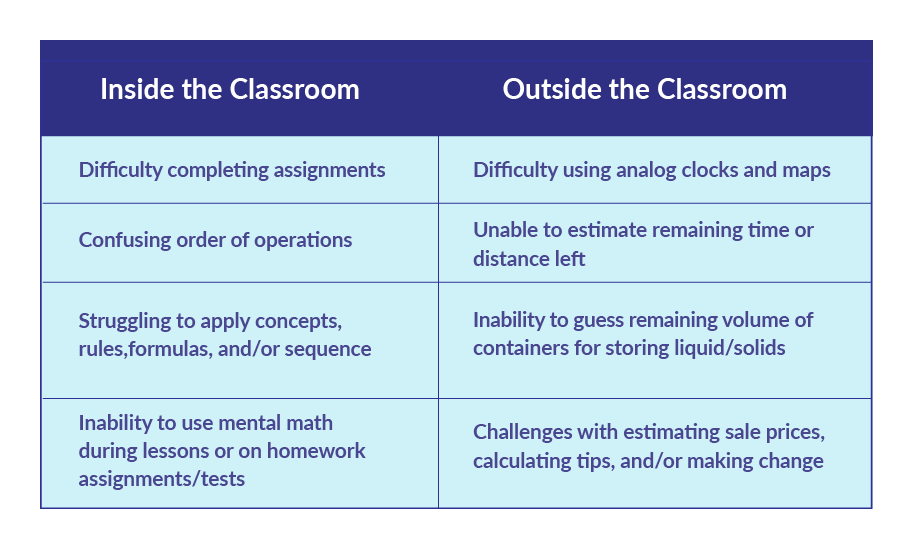What is Dyscalculia?
This blog is an excerpt from How to Identify, Screen, and Support Students with Dyscalculia, a summarization of The Transformative Potential of Early Screening for Dyscalculia, The Discounted Specific Learning Disability by Dr. Sandra Elliott and Sam Wertheim, Doctoral Candidate.
What is Dyscalculia?
Students with dyscalculia have difficulty understanding and manipulating numbers, estimating quantities, and performing mental math without writing things down. However, not everyone with dyscalculia will struggle in all areas of math.

Unlike math anxiety, which is a worry or fear about performing math calculations, people with dyscalculia have difficulty acquiring number-related skills. An estimated 7 percent of the world’s population (around 1 in 15 children, adolescents, and adults) struggle with math due to dyscalculia. It’s a lifelong math learning disability that can impact a student’s academic career, future employment, and self-esteem. It’s listed as a disability under both the Individuals with Disabilities Education Act (IDEA) and the Americans with Disabilities Act (ADA).
While teachers or caregivers often discover evidence of dyscalculia when children begin to learn about numbers and basic mathematical concepts, dyscalculia persists over time regardless of IQ or education level. It also affects individuals of all ages and is not gender specific.
Individuals with dyscalculia may have problems with:
- number sense (understanding the meaning and relationships of numbers),
- memorizing math facts,
- performing math calculations,
- reasoning mathematically,
- and solving math problems.
The longer dyscalculia goes unrecognized, the harder it is for children to get the instructional supports needed and get on grade level. When students lag behind their classmates in math, have difficulty following procedures, and are slow in problem-solving it can also lead to math anxiety and avoidance of math-related tasks when taking more advanced math courses during school.
How Does Dyscalculia Impact Student Learning?
Students with dyscalculia may not experience difficulty with all areas of math. Instead, they might encounter challenges in a specific area.
These areas include:
- Number Sense: Students with dyscalculia have difficulty understanding and recognizing numbers and counting and using number patterns. They may struggle with estimating quantities and solving math problems that involve basic number concepts.
- Memorization of Arithmetic Facts: For students with dyscalculia, memorizing math facts, such as multiplication tables, could pose greater challenges. They may forget recently learned facts and count on their fingers to solve math problems.
- Accurate and Fluent Calculation: Students with dyscalculia generally take longer to solve math problems and make more errors. They often rely on inefficient counting strategies and struggle with accuracy, especially when working through multi-step problems.
- Accurate Mathematical Reasoning: Students with dyscalculia have difficulty judging quantities and manipulating numbers. They may struggle to understand abstract mathematical representations and have trouble comparing numbers or identifying number sequences.
In addition to these specific math difficulties, students with dyscalculia may also face challenges with general reasoning that affect their math abilities.
These challenges could include:
- Working Memory: Dyscalculia can impact a students’ working memory, or their ability to hold and manipulate information. People with dyscalculia may have trouble remembering the steps in a math problem or have difficulty accessing numerical information quickly.
- Attention: Students with dyscalculia may struggle to focus their attention on math tasks and may be easily distracted. This can appear more often when they are asked to solve multi-step problems or when they haven’t fully automated certain math skills.
- Processing Speed: Students with dyscalculia often take longer to process and respond to math problems compared to their classmates. They may need more time to retrieve information or complete calculations accurately.
- Phonological Processing: Dyscalculia can affect a student’s ability to recognize and manipulate sounds in language, which is important for understanding and processing math problems that are spoken rather than written. Difficulties in phonological processing can hinder a student’s ability to work with numbers and solve arithmetic problems.
- Spatial Skills: Dyscalculia can impact a student’s spatial skills, including their ability to understand shapes, sizes, positions, and directions. Students need spatial skills to solve geometry problems and to visualize mathematical concepts.
- Logical/Non-Verbal Reasoning: Students with dyscalculia may have difficulty problem-solving and forming concepts without relying on language. Students must develop logical reasoning and non-verbal reasoning skills to identify patterns, understand problem constraints, and find solutions.

Individuals’ math abilities can vary, ranging from severe and long-lasting difficulties to temporary struggles that can improve with targeted interventions and practice.
How Can Poor Math Skills Affect Students Later On?
To be successful in advanced math topics, students must build a strong mathematical foundation while they are in early grades. By the end of second or third grade, students should understand basic operations such as addition, subtraction, and multiplication. If they’re unable to master these skills, it becomes even more challenging for them to grasp advanced math concepts in middle and high school.
Often, teachers in upper elementary and middle school seek help for students who are falling significantly behind in math. Unfortunately, students who go undiagnosed with a learning disability such as dyscalculia may not receive additional support when they need it, leading to years of lost potential assistance.
To bring awareness to dyscalculia and address these challenges, educators can help students improve their math skills, bridge learning gaps, and boost their academic and future career success.
About TouchMath
TouchMath is an evidence based, multi-sensory intervention for students who struggle with math or have a specific math learning disability like dyscalculia. Check out our resources for more information on dyscalculia and math interventions:
- Our Dyscalculia 101 page is your one-stop-shop for all things dyscalculia.
- Checkout our dyscalculia workshop sessions.
- Access our free dyscalculia screening tool.
We’re changing the way students experience math. Ready to talk interventions?
